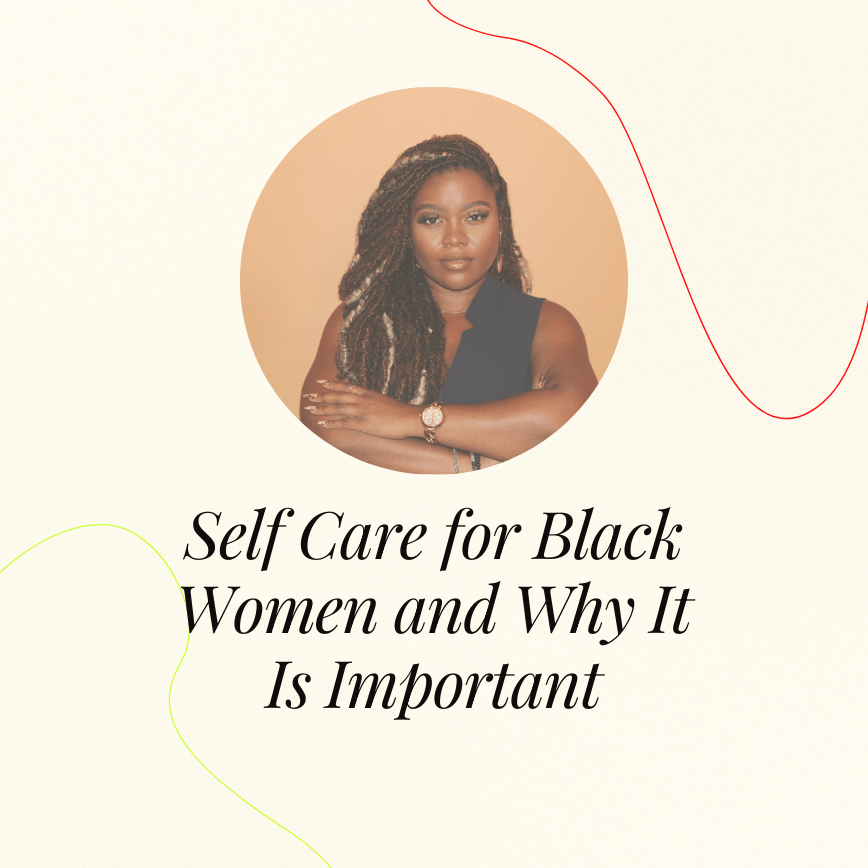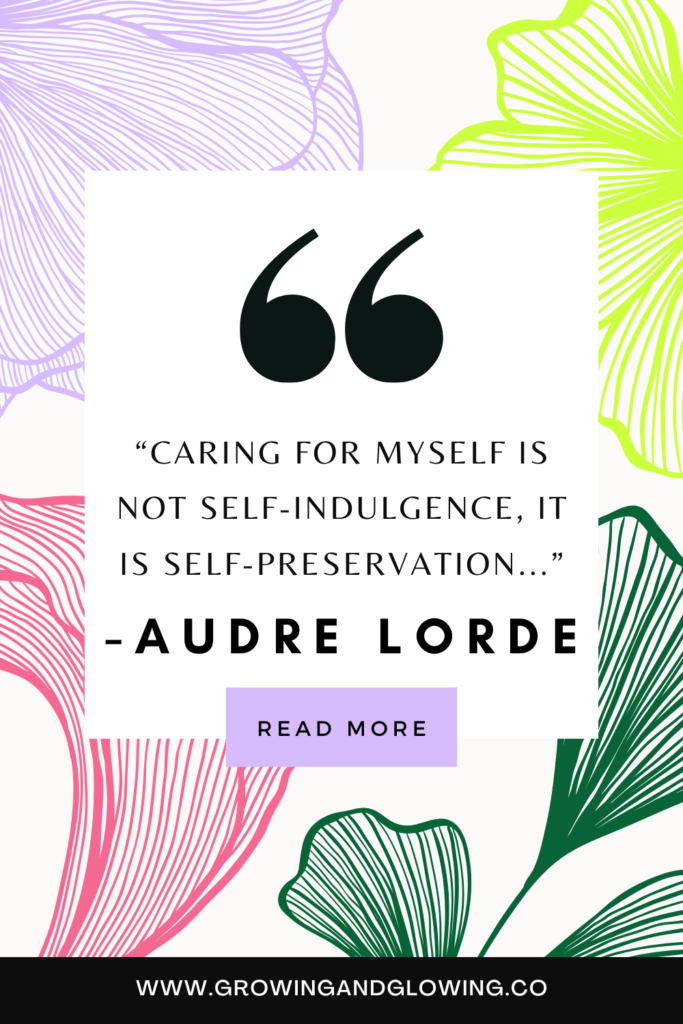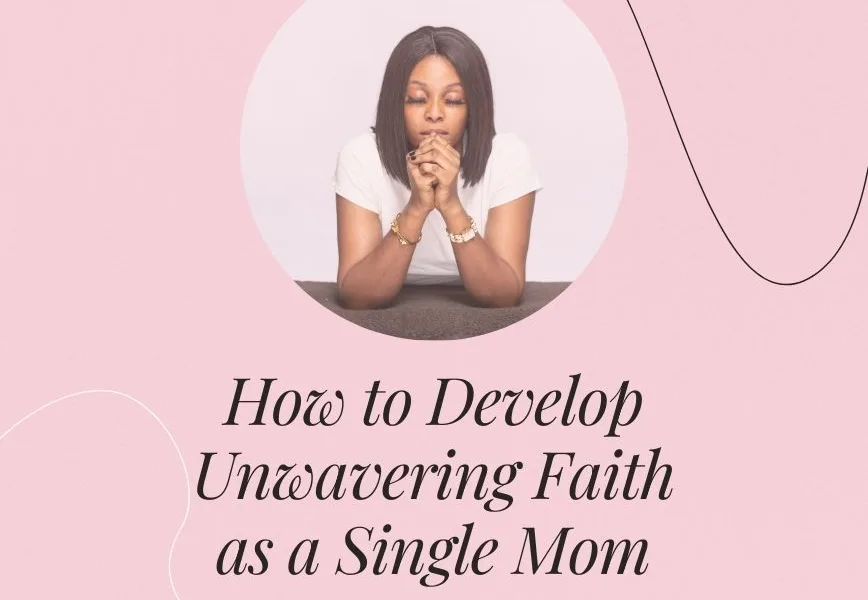
This post contains affiliate links, which means I receive a small commission, at no cost to you 🌻, should you make a purchase through a link.
Before discussing the importance of self-care for black women, we need to define self-care.
Self-care is the act of actively engaging in activities that support the pillars of wellness. These pillars include mental, spiritual, physical, social, occupational, intellectual, financial and environmental wellness.
Specifically, Self-care for black women has become a growing topic of conversation over the last few years, and rightfully so. As views around self-care start to shift from a negative undertone of being selfish, more black women are finding true happiness and discipline through their personal self-care choices.
Nature vs Nurture
The underrated truth is most black women struggle with prioritizing self care. From childhood, black women are plagued with adult responsibilities, with emphasis being placed on taking care of the needs of others. Black women have learned to nurture and sacrifice. However, this nurture and sacrifice has been to the detriment of the individual.
Most black women take on caretaker roles as children, by looking after siblings, younger family members and attending to aging grandparents in the home. Even today, Black women are overrepresented in caregiving work.1 Subsequently, they also lead the percentage of children raised in single-mother households at 45.7% compared to less than 25% of other races.2
In all this care for others, black women lean to find personal value based on how much they can perform for others and have overlooked the requirement to reciprocate that energy to themselves. They have become acclimated to the idea of sacrificing themselves for their loved ones and hyper-independence. This is why self-care is imperative for black women.

COmmon Misconceptions and how they are harmful
1. Strong Black woman
There are many harmful stigmas floating around society surrounding black women about who they are or who they should be. I’m sure you’ve heard women being described as “strong black women” because they are dealing with and pushing through generational burdens or unfortunate life circumstances, including domestic violence, sole provider and caretaker roles, wage disparities, poverty, etc.
The strong black woman stigma has even been worn as a badge of honor in the black community. Even though, this often leads to unmet needs. Black women are expected to “deal with it” or “push through” with grace. We are a resilient people, but that does not mean we must deal with our issues alone.
2. Black Girl Magic
Having “Black Girl Magic” is another disadvantage black women face. When misunderstood, Black girl magic may lead others to believe black women are superhuman.
Black women are not mythical or superhuman. Our magic is in our realness, our love, and the way we rally around one another.
Jenee Osterheldt, -“What we mean by Black Girl Magic“
This false belief may also show up in the workplace, where it is notorious for perpetuating harmful stigma of black women. According to the Status of Black Women Executive Summary,3 80.6% of black women are the breadwinners for their families. This information is important because we often bring our nurturing into the workplace by taking on additional projects to exemplify worthiness. At 80.6%, this may affect a large number of women. The expectation to overperform in a role, with the only immediate incentive of being known as a ‘hard worker”, is troubling because even so, black women are less likely to be promoted to manager positions compared to their counterparts.
In the BWT Report of 2022,4 72% of black women participate in code-switching; Changing language, style of dress, hairstyles, etc., to assimilate with their counterparts. The need to perform to feel accepted, limit microaggressions, and navigate stereotypes in the workplace opens the door to chronic workplace stress, leading to burnout and adverse health effects.
3. Angry Black Woman
Similar to “Black Girl Magic”, “Angry Black Woman” also shows up in the workplace. This pervasive stereotype not only characterizes Black women as more hostile, aggressive, overbearing, illogical, ill-tempered and bitter, According to the Harvard report, research has found that when some people see a Black woman become angry, they’re likely to attribute that anger to her personality — rather than an inciting situation.5
Self care for black women and health
With all, black women must overcome in the family unit, society, and in the workplace, while also breaking down barriers, this can take a toll on their mental health. Not to mention the noted statistics:
Black women of all ages were twice as likely to be imprisoned as White women,
40% of black women will experience domestic violence in their lifetime compared to 31% of all other races per the Status of Black Women Executive Summary.
To the contrary, black women are still increasing percentages in businesses owned as well as degrees earned. Yet, there still are not many resources specifically designed to support black women with mental health as they work to release the cultural stigma surrounding it.
ABC News sat down with Michelle Williams, who speaks openly about her history of depression. Williams said “Mental health struggles can look different in women of color. Irritability is a missed symptom of depression, because we think depression is just sadness.”6
Black women who do not prioritize regular self-care are more likely to suffer from health ailments including but not to limit, heart disease, stroke, diabetes, breast and cervical cancer and mental health illnesses such as depression and anxiety regardless of our many societal achievements.
This is where self-care steps in. It’s important that we begin to look inward and not seek validation externally. We can do this through the 7 self-care practices below.
7 ways black women can practice self care now
1. Self-Acceptance
Self-acceptance can benefit black women in self-care by allowing them to recognize their worth and prioritize their own well-being without seeking external validation.
2. Prioritizing Mental Health
Understand your unique challenges to better address them, evaluate what may be causing stress, and create a plan to decrease the effects of this burden. Take action to release any stigmas surrounding mental health you may have learned. Needing help doesn’t make you weak, it makes you human. So, If you need to speak to a mental health professional, please view the online therapy resources below:
3. Listen to your body
Your worth is not tied to how much you perform. So, Get rest when you are tired, use your personal time, and move your body to eliminate stress and increase overall health.
4. Set boundaries at work, with friends, and family
Setting boundaries allows you to reserve your energy for what is important to you. You are not required to sacrifice your time, energy, or sanity. Practice disconnecting from the expectations of others. It may sound simple, but practice saying “no.” You would not believe how much stress could be reduced by simply saying “no.”
5. Find activities Related to your interests
Participate in activities that allow you to increase your knowledge, skills, and abilities in areas that are important to you.
- Join a club
- Start a hobby
- Attend a workshop
- Volunteer
6. Journal
As women, we may hold a lot of tension that creates unnecessary stress. Get your thoughts out on paper. Writing can be a releasing and therapeutic activity that can help you release this tension and reduce stress.
The journal prompts below will get you started.
- In what areas of your life can you take better care of yourself? How can you start taking better care of yourself in those areas?
- What are your biggest strengths? How can you use them to achieve your goals?
- What are the most important things you have learned in life so far?
7. Support Black Women
We have to rebuild the level of support for black women, and it will need to start with us. Listen to other black women and provide support where you can. You may do this by simply listening to understand and validating a black woman’s experience without rushing to find a solution for them or dismissing their concern.
You may also advocate for black women through organizations in your area and volunteerism at domestic violence shelters and spaces that cater to alleviate the disparities of black women.
Self-care for black women is crucial for overall well-being and happiness. It’s important to recognize and challenge the harmful stigmas and misconceptions that surround black women in society and prioritize self-preservation and self-acceptance. By actively engaging in activities that support the 8 pillars of wellness and seeking support from a community that uplifts and understands the unique challenges black women face, we can work towards breaking down barriers and achieving mental, emotional, and physical well-being. It’s time for black women to embrace self-care as a powerful tool for empowerment, healing, and resilience.

- Black women have a legacy of caregiving that deserves a policy response ↩︎
- Living Arrangements of Children: 2019 ↩︎
- The Status of Black Women in the United States, Executive Summary ↩︎
- Black Women Thriving BWT Report: 2022 ↩︎
- The “Angry Black Woman” Stereotype at Work ↩︎
- Black women suffer disproportionately from superwoman schema ↩︎
This post contains affiliate links, which means I receive a small commission, at no cost to you 🌻, should you make a purchase through a link.




https://t.me/s/official_1win_aviator/181
https://t.me/s/official_1win_aviator/139
https://t.me/Best_promocode_rus/3068
xn88 có uy tín không – Cơn lốc mới trên bản đồ giải trí trực tuyến 2025, hứa hẹn khuấy đảo cộng đồng cược thủ yêu thích sự đẳng cấp và đổi mới. Đây, là điểm đến lý tưởng cho người chơi tìm kiếm cơ hội làm giàu, là biểu tượng cho xu hướng cá cược thời đại mới.
Nếu bạn đang tìm kiếm một sân chơi giải trí trực tuyến ổn định, hiện đại và đa dạng trò chơi, xn88 app com chính là lựa chọn đáng để trải nghiệm. Với hệ thống trò chơi phong phú như: Bắn Cá Đổi Thưởng, Mini Game Đá Gà, Xổ Số Ba Miền, Thể Thao Điện Tử,… Tại đây mang đến không gian giải trí sống động, phù hợp với nhiều đối tượng người dùng.
Sau khi xác nhận thành công, bạn có thể đăng nhập vào tài khoản của mình và bắt đầu trải nghiệm các trò chơi hấp dẫn tại 888slot app. Lưu ý, mỗi người chỉ được phép có một tài khoản để đảm bảo tính công bằng và tránh các rắc rối về bảo mật.
https://t.me/s/ef_beef
thanks for info.
Can you be more specific about the content of your article? After reading it, I still have some doubts. Hope you can help me. https://accounts.binance.info/fr-AF/register-person?ref=JHQQKNKN
9qgldw
Your article helped me a lot, is there any more related content? Thanks! https://accounts.binance.com/zh-TC/register?ref=DCKLL1YD
Tham gia giải trí nhất định anh em không nên bỏ qua sảnh chơi cá cược thể thao. tài xỉu 66b. com đưa tới cho cược thủ hàng trăm các tỷ lệ kèo siêu hấp dẫn trên khắp thế giới, tỷ lệ thưởng đa dạng. Với nhiều giải đấu lớn nhỏ được cập nhật liên tục mỗi ngày như Champions League, Euro, La Liga, Serie A, Premier League, World Cup,…
https://t.me/iGaming_live/4872
Your article helped me a lot, is there any more related content? Thanks!
Ngoài ra, giao diện của 66b chính thức cũng được thiết kế phù hợp với nhiều loại thiết bị, bao gồm cả điện thoại di động. Điều này giúp người chơi có thể dễ dàng truy cập và tham gia vào các trò chơi ở bất cứ đâu và bất cứ lúc nào. TONY12-16
Führende E-Wallets, Zahlungskarten und sofortige
Banküberweisungen sind nur einige der sicheren und zuverlässigen Optionen, die Mystake Casino
bietet. Wenn Sie Geld einzahlen oder abheben, empfehlen wir Ihnen,
nur sichere Zahlungsmethoden zu verwenden. Lesen Sie die Bedingungen jedes Angebots, um das
Beste aus Ihrem Bonus herauszuholen, egal ob es sich um Freispiele, Cashback
oder zusätzliches Geld zum Spielen Ihrer Lieblings-Slots handelt.
Freispiele, Cashback und unterhaltsame Turniere zeichnen Mystake Casino
aus und machen jede Sitzung lohnender. Es gibt keine geheimen Regeln; Überprüfen Sie einfach
Ihr Guthaben und verwenden Sie das Geld, wie Sie möchten. Schalten Sie einfach die Drehungen von Ihrem
Dashboard aus ein und verwenden Sie sie für alle berechtigten Spiele,
die in Ihrem Konto angezeigt werden.
Wenn Sie ein neuer Spieler sind, können Sie bei der Anmeldung den Willkommensbonus von nutzen. Willkommensboni sind die Boni für neue Spieler.
Mystake bietet regelmäßig Angebote und Boni mit unterschiedlichen Bedingungen an. Wenn Sie sich an die Turnierregeln halten, erhalten Sie Punkte.
Durch die Zusammenarbeit mit den besten Altersüberprüfungsdiensten der Branche stellen wir
sicher, dass alle unsere Kunden diese Anforderung erfüllen. Bei der Registrierung
müssen Sie nachweisen, wer Sie sind, und wir überprüfen regelmäßig
die Konten, um sicherzustellen, dass sie den Regeln entsprechen. Sie können beispielsweise den Geldbetrag begrenzen, den Sie jeden Tag,
jede Woche oder jeden Monat direkt in Ihrem Profil einzahlen können. Wir
empfehlen allen Benutzern, sie für das sicherste Erlebnis in unserem Casino einzuschalten. Unser Kundenservice-Team ist darauf geschult, alle Fragen zur
Sicherheit schnell zu beantworten.
References:
https://online-spielhallen.de/casino-bonus-ohne-einzahlung-2025-gratis-no-deposit-boni/
I don’t think the title of your article matches the content lol. Just kidding, mainly because I had some doubts after reading the article. https://www.binance.com/ru/register?ref=O9XES6KU
Für neue Spieler hält das Zodiac Casino einen großzügigen Willkommensbonus bereit.
Egal, ob Sie ein Fan von Spielautomaten, Roulette, Blackjack
oder anderen Casino-Klassikern sind, im Zodiac Online Casino mit Echtgeld werden Sie sicher fündig.
Das 2001 gegründete Zodiac Casino hat sich einen guten Ruf für seine umfangreiche
Spielauswahl und seine verlockenden Werbeangebote erworben.
Indem sie sich für das Zodiac Casino entscheiden, können die Spieler darauf
vertrauen, dass sie an einem renommierten und zuverlässigen Online-Spielort spielen. Außerdem
bieten unsere großzügigen Bonusangebote echten Wert – zahle nur 1
€ ein, um 80 Chancen/Drehungen beim Mega Money Wheel Jackpot zu erhalten, und dann vier weitere Einzahlungsboni bis zu
insgesamt ~$480! Und mit sofortigen Auszahlungen, 24/7-Support und elegantem mobilem Zugriff kannst
du überall und jederzeit spielen. Von Spielautomaten und progressiven Jackpots bis hin zu
Tischspielen, Live-Dealern und Video-Poker ist für jeden Spielertyp etwas dabei.
Spieler können dem Casino Rewards Treue-Netzwerk beitreten und das
aufregende Erlebnis genießen, in einem der etabliertesten Online-Casinos zu
spielen.
References:
https://online-spielhallen.de/sg-casino-promo-code-ihr-weg-zu-exklusiven-vorteilen/
Halten Sie bei einer Bootstour Ausschau nach Walen und Delfinen und
genießen Sie bei einem Zwischenstopp in einer der zahlreichen Buchten die herrlichen Kontraste, die das
Grün dieser wunderschönen Insel mit dem Blau des Meeres bildet.
Es befindet sich direkt am Kreuzfahrthafen in der Bucht von Funchal, nur
fünf Minuten zu Fuß vom Stadtzentrum und dem Mittelpunkt des gesellschaftlichen und kulturellen Lebens entfernt.
Entdecke weitere Urlaubsangebote und Flüge Wir haben keinerlei Kontrolle über den Inhalt dieser Seiten oder Ressourcen.
Das Dockside ist der ideale Ort für einen erholsamen Tag.
Hier finden an besonderen Terminen auch die Galadinner statt,
aber selbst an normalen Abenden erfordert die Kleiderordnung beim Abendessen ein wenig Sorgfalt, wodurch
bei Ihrer Mahlzeit ein etwas eleganteres Ambiente entsteht.
Die Tagungs- und Konferenzräume im Pestana Casino Park, die den Gästen des Pestana
Casino Studios zur Verfügung stehen, sind ideal für große Veranstaltungen, Konferenzen, Kongresse und Meetings.
Für ein Abendessen mit Live-Shows ist das Bahia
Restaurant im Casino die ideale Wahl.
References:
https://online-spielhallen.de/locowin-casino-deutschland-dein-umfassender-guide/
Thank you for your sharing. I am worried that I lack creative ideas. It is your article that makes me full of hope. Thank you. But, I have a question, can you help me?
Gaming machines include games like pokies and video poker.
Country Club is also a boutique hotel that caters to
all your overnight needs. Country Club Casino is located in Launceston, Tasmania, and is the only
land-based casino in the area. Inspired by the spirit of the Wild
West, the menu features standout entrées like smoked beef tartare with cornbread
crostini, cowboy butter roasted scallops, and jalapeño
poppers with citrus yogurt and charred corn salsa.
The casino launches new promotions on a monthly basis, and the current is promos ending soon. Of course, we have to mention the bonuses and promotions that you will receive when you play at Country Club casino.
VIPs usually get first access to games, and they receive
special bonuses and personalized experiences whenever they step foot in the building.
VIP packages are tailored made to the needs of high rollers and offer
perks and games that aren’t accessible to the ordinary player.
Country Club Casino has state of the art gaming machines that offer a wide variety of betting denominations and come in a variety of
themes, formats and prize sizes.
Our 18-hole mini-golf course will also be a big hit with adults and families alike.
Includes putter and golf ball hire. Why not try a round of mini
golf at The Range? Range Bay pricing is for 1 – 6
people and includes club hireWhen are peak and non-peak times?
Select your preferred time, with options across peak,
and non-peak periods.
References:
https://blackcoin.co/casino-world-a-comprehensive-overview/
The model will roll out to paid ChatGPT users and
developers in three versions — Instant, Thinking, and Pro —
tailored for everything from everyday tasks to complex reasoning and high-accuracy work.
OpenAI has updated its guidelines for users under 18 and released new resources for parents
to promote safer interactions with ChatGPT. One study analyzed ChatGPT’s
responses to 517 questions about software engineering or
computer programming posed on Stack Overflow for
correctness, consistency, comprehensiveness, and concision. Some,
including Nature and JAMA Network, “require that authors disclose the use of text-generating tools and ban listing a large language model (LLM) such as ChatGPT as a co-author”.
As of 2023, there were several pending U.S. lawsuits challenging the use of copyrighted data to train AI models, with defendants arguing that this falls under fair use.
This includes text-to-image models such as Stable Diffusion and large language models such as ChatGPT.
OpenAI had previously declined such prompts due to the potential
controversy or harm they may cause. The organization originally estimated that the best-performing configuration of o3 it tested, o3 high, would cost approximately $3,000 to address a single problem.
The Arc Prize Foundation, which develops the AI benchmark
tool ARC-AGI, has updated the estimated computing costs for OpenAI’s o3 “reasoning” model managed by ARC-AGI.
AI researcher Tibor Blaho spotted a new “ImageGen” watermark feature in the new beta of ChatGPT’s Android app.
OpenAI has launched its AI browser, ChatGPT Atlas, starting on Mac, letting users get answers from ChatGPT instead of traditional search results.
OpenAI’s new “company knowledge” update for ChatGPT lets Business, Enterprise, and Education users search workplace data across tools like Slack,
Google Drive, and GitHub using GPT‑5, per a report by The Verge.
OpenAI’s new ChatGPT shopping feature lets
users get product recommendations by describing features
or sharing photos to find similar items at different prices.
References:
https://blackcoin.co/baccarat-guide-how-to-play-win-at-baccarat/
There are many rules in place when playing with a no deposit bonus.
You can think of these as a way to test out a new casino and its games without risking your
money. Casino bonuses are often divided into two groups – no
deposit bonuses and deposit bonuses. No deposit bonuses are usually pretty
straightforward, but there are some potential issues you should be aware of before claiming one.
You should always check the casino’s instructions on how to claim your no deposit bonus.
With more than 7,000 meticulously reviewed casinos in our database, it’s not a surprise that
our reviewers have come across many unique
bonus activation procedures.
After all, there’s little reason to say ‘no’ to free money, no matter your budget.
She began her career as a Features Writer for several weekly
and monthly magazines, and has a decade’s worth of experience
in writing, researching and editing casino content.
But once you’ve had your free spin or bonus cash fix, what’s next?
Top sites support fast, safe, and flexible casino banking options, all
optimized for CAD transactions.
References:
https://blackcoin.co/wild-casino-review-safety-games-more/
After Russia invaded Ukraine in late February 2022, Ukrainian Vice Prime Minister,
Minister of Digital Transformation Mykhailo Fedorov and others called on Cloudflare to stop providing its services in the Russian market amidst reports that Russia-linked websites spreading disinformation were using the
company’s content delivery network services.
Cloudflare, Inc. is an American company headquartered in San Francisco that provides
a range of internet services, including content delivery
network services, cybersecurity, DDoS mitigation, wide area network services,
reverse proxies, Domain Name Service, and ICANN-accredited
domain registration. Over 60 cloud services on one unified platform, uniquely
powered by a global cloud network. Switter was a social media network for the sex worker community,
built by Australia-based company Assembly Four on Mastodon’s open-source software,
before Cloudflare dropped Switter as a client and
ceased services in April 2018, citing terms of service violations.
The company also released a blog post and likened their services to that
of a public utility, emphasizing that they do not believe in shutting down security services based on content
they find objectionable.
The campus is located on both sides of the State Route
520 freeway, which connects it to the cities of Bellevue and Seattle
as well as the Redmond city center. The city of
Redmond had also approved a rezone in February 2015 to raise the height limit
for buildings on the campus from 6 stories to 10. The Seattle Times reported in early September
2015 that Microsoft had hired architecture firm Skidmore, Owings
& Merrill to begin a multibillion-dollar redesign of the Redmond campus, using an additional
1.4 million square feet (130,000 m2) allowed by an agreement with
the City of Redmond. In 2009, a shopping
mall called “The Commons” was completed on the campus,
bringing 1.4 million square feet (130,000 m2) of retail space, as
well as restaurants, a soccer field and pub to the West
Campus. Microsoft also announced its intention to contain most its future growth
within Redmond, while retaining some offices in Downtown Bellevue and Factoria.
References:
https://blackcoin.co/stay-casino-australia-review-and-bonuses-2025/
According to W3Techs, Cloudflare is used by around 19.3% of all websites on the Internet for its web security services, as of January 2025.[update]
Get easy, instant access to Cloudflare security and performance services.
Stop bot attacks in real time by harnessing data from millions of websites protected by Cloudflare.
Modernize your network and secure your workspace against unauthorized access, web browsing attacks and phishing.
We make websites, apps, AI agents, and networks faster and
more secure.
In 2018, The Huffington Post documented that Cloudflare provided services for “at least 7 terrorist groups”, as
designated by the United States Department of State
including Al-Shabaab, the Taliban, the Popular Front for the Liberation of Palestine, the al-Quds Brigades,
the Kurdistan Workers’ Party (PKK), the al-Aqsa Martyrs’ Brigades, and Hamas.
The blog post mentioned Cloudflare’s terms of use agreement, which
allows them to terminate service due to “content that discloses sensitive personal information, [and] incites or exploits violence against people”
but, according to The Guardian, the statement did not address how Kiwi Farms users’ doxxing behavior did not violate
these terms. In 2019, Cloudflare was criticized for providing services to the far-right discussion and imageboard 8chan. In 2017, after previously
refusing to take any action against the website, Cloudflare stopped providing its services to The Daily Stormer after an announcement on the website asserted that Cloudflare executives were privately supporting its ideology.
Cloudflare attributed the outage to a change in the configuration of
a database, which caused an invalid file to be sent
to all servers on the network.
References:
https://blackcoin.co/18_what-is-a-high-roller-at-a-casino-what-high-roller-actually-means_rewrite_1/
Playing responsibly keeps the fun going while managing budget and time, letting you adjust limits anytime for a tailored experience.
These options are easy to use, ensuring you stay in control while enjoying
Win Spirit online casino. Win Spirit Casino cares about your
well-being and offers tools to help you gamble responsibly.
Pick the option that fits your needs and start playing with confidence.
Limits vary by method, so you can plan your gaming sessions without surprises.
Adding new AUD-friendly payment systems is on our roadmap for the coming months.
The platform implements industry-standard security measures including SSL encryption and certified RNG systems.
Deposit limits allow setting daily, weekly, or monthly maximum deposit amounts to manage spending.
WinSpirit Casino implements responsible gambling measures
aligning with industry standards and regulatory requirements.
Players experiencing installation difficulties should consult the
dedicated mobile support section or contact customer service
for assistance. IOS users can access the application through direct links or QR codes provided on the main website.
Android users can download the APK file directly from the casino website,
requiring security settings adjustment to permit installation from non-Play Store sources.
Whether you’re playing slots or live dealer games, you can set limits to keep gaming fun and stress-free.
These bonuses make your gaming more fun, letting you enjoy the casino’s slots and games without spending upfront.
With a vast selection of slots, table games, and
live dealer options, it caters to all types of players,
including those in Australia.
References:
https://blackcoin.co/how-to-spot-poker-cheats-and-what-to-do-with-that/
paypal online casinos
References:
https://www.postajob.co.uk/employer/paypal-casino-uk-best-paypal-casinos-for-december-2025/
casino online paypal
References:
pandahouse.lolipop.jp
us poker sites that accept paypal
References:
https://stayzada.com/bbs/board.php?bo_table=free&wr_id=549753
online poker real money paypal
References:
https://assamwork.com/employer/paypal-casinos-best-online-casinos-that-accept-paypal/
paypal casino online
References:
http://icfoodseasoning.com/bbs/board.php?bo_table=free&wr_id=625105
paypal online casino
References:
https://prefereplus.com/employer/online-casino-sites-in-australia-december-2025/
888slot – download 888slot – apk 888slot apk có chính sách hoàn tiền theo sản phẩm: casino 0.8%, thể thao 0.5%, slot 0.3% – tích lũy hàng tuần và tự động cộng vào tài khoản mỗi thứ Hai. TONY01-04H
888slot thường xuyên tổ chức các giải đấu Slot với tổng giải thưởng lên đến hàng trăm triệu đồng để tri ân hội viên. TONY01-06H
Your point of view caught my eye and was very interesting. Thanks. I have a question for you.
đăng ký 66b tái định nghĩa trải nghiệm cá cược thể thao với hơn 4.000 giải đấu mỗi tháng, cung cấp tỷ lệ kèo chính xác và cập nhật liên tục theo biến động thị trường. TONY01-16
I don’t think the title of your article matches the content lol. Just kidding, mainly because I had some doubts after reading the article. https://accounts.binance.info/es-AR/register-person?ref=UT2YTZSU
Thanks for sharing. I read many of your blog posts, cool, your blog is very good.